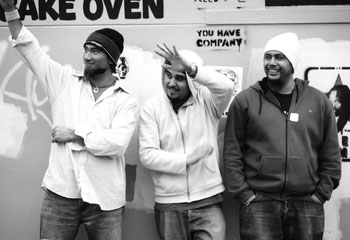TRINITY ROOTS / “Little Things (Remix)”
"We use roots as a vehicle or medium to convey emotion. We combine lyrical message with primal rhythms, often Afro/Cuban or dancehall. We are organic in our music and spiritual in the way we play it."We’re heading back down under. It’s kiwi time again.
—Warren Maxwell

Trinity Roots, the primordial New Zealand roots/reggae/soul band consisting of Warren Maxwell (lead vocals/guitar), Rio Hemopo (backing vocals/bass) and Riki Gooch (backing vocals/batterie/traps). They formed in 1998 and disbanded in February 2005. On the New Zealand scene they are legendary for both their live performances and their success as an independent band.
They produced two full LPs (True and Home, Land & Sea) and one EP (Trinity Roots). They were the first New Zealand group I listened to on a deep level. They are both sophisticated and street. They recorded in their own studio and on the beach. Produced themselves. Never tried to go commercial/pop. They are a deep authentic New Zealand alternative.
…the band was formed in 1998, when all three members were studying at the University’s Conservatorium of Music.
Guitarist and lead vocalist Warryn Maxwell started out with the Jazz Foundation course, then went on to complete his Bachelor of Music degree in 2001. He also managed to splice a Mäori component into his studies with a Certificate in Tohu Ara Poutama, and last year he came back to the Conservatorium as a tutor. Like Maxwell, fellow musicians Rio Hemopo (bass/vocals) and Riki Gooch (vocals/samples/percussion) have also been playing in other bands in and around Wellington – including Jonathan Crayford’s band and Fat Freddy’s Drop – and their sound has evolved from the capital’s unique jazz, funk and soul traditions.
Also in the best Wellington tradition, they’ve avoided the trap of signing to a major label, preferring to do it all themselves. This was true of their debut EP, released in 2000, and now of their first album, True, recorded in a farmhouse near Dannevirke and mixed on a computer at home.
—http://masseynews.massey.ac.nz/magazine/2003_April/stories/trinity_roots.html
The Trinity Roots sound is deceptive. At first listen they seem to be a folksy dance band, but there is a high degree of both musicianship and meaning in their music. They exemplify self-determination and cultural identification, social awareness and spiritual strivings.

Hollie Smith is featured on “Passion,” the most gentle anti-establishment songs one is likely to ever hear with its refrain “don’t play their game.” They do a funky barbershop/doo-wop stylee on “Just Like You.” (The crackling you hear in the background is firelight—standing around a fire crooning, these dudes is teetotally down). Rural night sounds introduce “Home, Land & Sea,” an earthy paean to their homeland. They have about a zillion different versions of “Little Things”—two of them are presented here. And we close with “Beautiful People,” a self-explanatory injunction, a gentle and exquisite wake up call.
Trinity Roots is a New Zealand truth we all can feel.
For more info, check their website: http://www.trinityroots.com
—Kalamu ya Salaam
'Black music'
This is, what, Kalamu’s fourth or fifth installment of contemporary music from New Zealand? After hearing all of these bands, I’m starting to hear a commonality in sound. I don’t know if it’s just the bands Kalamu happens to pick, or if the popular music of the country has a certain sound, but I almost feel like I could recognize the music of one of these bands even if I’d never heard them before. One of the first things I notice is how patient they are, musically. I know that might sound a little strange. Let me explain. Younger or newer artists often seem afraid to let their music breathe. It’s almost like they want to fill every available empty space with some sort of sound. It’s like they're afraid to give us even a moment to ourselves, afraid that we’ll notice that they don’t know what they’re doing. These New Zealand bands that Kalamu’s been dropping on us—even the ones I don't like—never seem like they’re in a rush. They have a down-home, ordinary sort of confidence that seems more like something intrinsic to their culture in general as opposed to a quality any one of them have individually.
As for whether or not I like Trinity Roots, I do. Of all the New Zealand stuff, I’ve liked Fat Freddy’s Drop the most with these guys as a close second. Kalamu picked the right track to feature. The "Little Things" remix is happening. "Home, Land & Sea" is going to stay with me too. But overall, I’m still trying to get over the fact that people from New Zealand are playing what I—or anyone else—would recognize as 'black music.'
—Mtume ya Salaam
We Are Deeper Than We Know
Listen to Warren Maxwell talk about his musical development:
I grew up in Whangarei (not exactly the music capital) but had a choice saxophnoe tutor, Jim Thorne, who introduced me to producer Quincy Jones. The funk changed my musical tastes from Quiet Riot and Twisted Sister to a blacker soul music. Then came the sing song parties at the Alldred whanau’s place. Otis REdding and Ray Charles never sounded so “unique”... especially after a crate or three.In Trinity Roots, Warren was the lead vocalist and guitarist. In Fat Freddy's Drop, Warren is the saxophonist and backup vocalist.
The Wellington Conservatirium in 1991 began my vocab extension. From Louis Armstrong to Eric Dolphy, every album a masterclass in expression. Bob Marley actually came later in life for me around the same time as John Coltrane. Both expressing Love and Scorn, lost and found, mostly lost.
Met the “bros” out of a collective passion for jamming some singles soul classics after the barrage of infinite contrapuntal chordal modulations... and here we are 2 albums, 1 EP, 1 video, our own record company and a trip to Europe... more to come I’m sure.
These cats are serious musicians.
What is most distinctive about them is not how much they were influenced by Black music but rather how they remain rooted in theirown culture even as they absorb and adopt modes of self-expression that come from other cultures. We can learn a lot from them, just like they have learned a lot from us.
Indeed, Fat Freddy, Trinity Roots, and a host of others in Kiwi land are testaments to just how strong our influence has been worldwide. And I'm not through sharing New Zealand music, just wait til you hear a rapper named Scribe or some of a host of reggae groups, not to mention a singer whose last name happens to be Black! I'm telling yall, there's a (w)hole in the earth where all the hip folk meet up... to be continued.
—Kalamu
This entry was posted on Sunday, December 17th, 2006 at 12:36 am and is filed under Contemporary. You can follow any responses to this entry through the RSS 2.0 feed. You can leave a response, or trackback from your own site.
One Response to “TRINITY ROOTS / “Little Things (Remix)””
December 18th, 2006 at 4:00 pm
Which album would you recommend starting with for a novice Trinity Roots or Fat Freddy listener, if you had to pick one to start with?
Leave a Reply
| top |